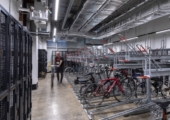June 23, 2024
North American office design lagging behind new working cultures
 A report from design firm Hassell and workplace analytics business Density paints what it claims is a concerning picture of North American tech offices. It says that tech firms, once considered pioneers in innovative office design, are lagging behind the evolving work landscape. The report [registration] analysed over 1.4 million square feet of workspace usage between May 2023 and May 2024, revealed what it says is a troubling trend: underutilisation. On average, these tech offices only reached a peak occupancy of 34 percent, meaning a significant portion of the space – potentially costing companies up to $40 million annually in wasted rent – sits empty. More →
A report from design firm Hassell and workplace analytics business Density paints what it claims is a concerning picture of North American tech offices. It says that tech firms, once considered pioneers in innovative office design, are lagging behind the evolving work landscape. The report [registration] analysed over 1.4 million square feet of workspace usage between May 2023 and May 2024, revealed what it says is a troubling trend: underutilisation. On average, these tech offices only reached a peak occupancy of 34 percent, meaning a significant portion of the space – potentially costing companies up to $40 million annually in wasted rent – sits empty. More →





































